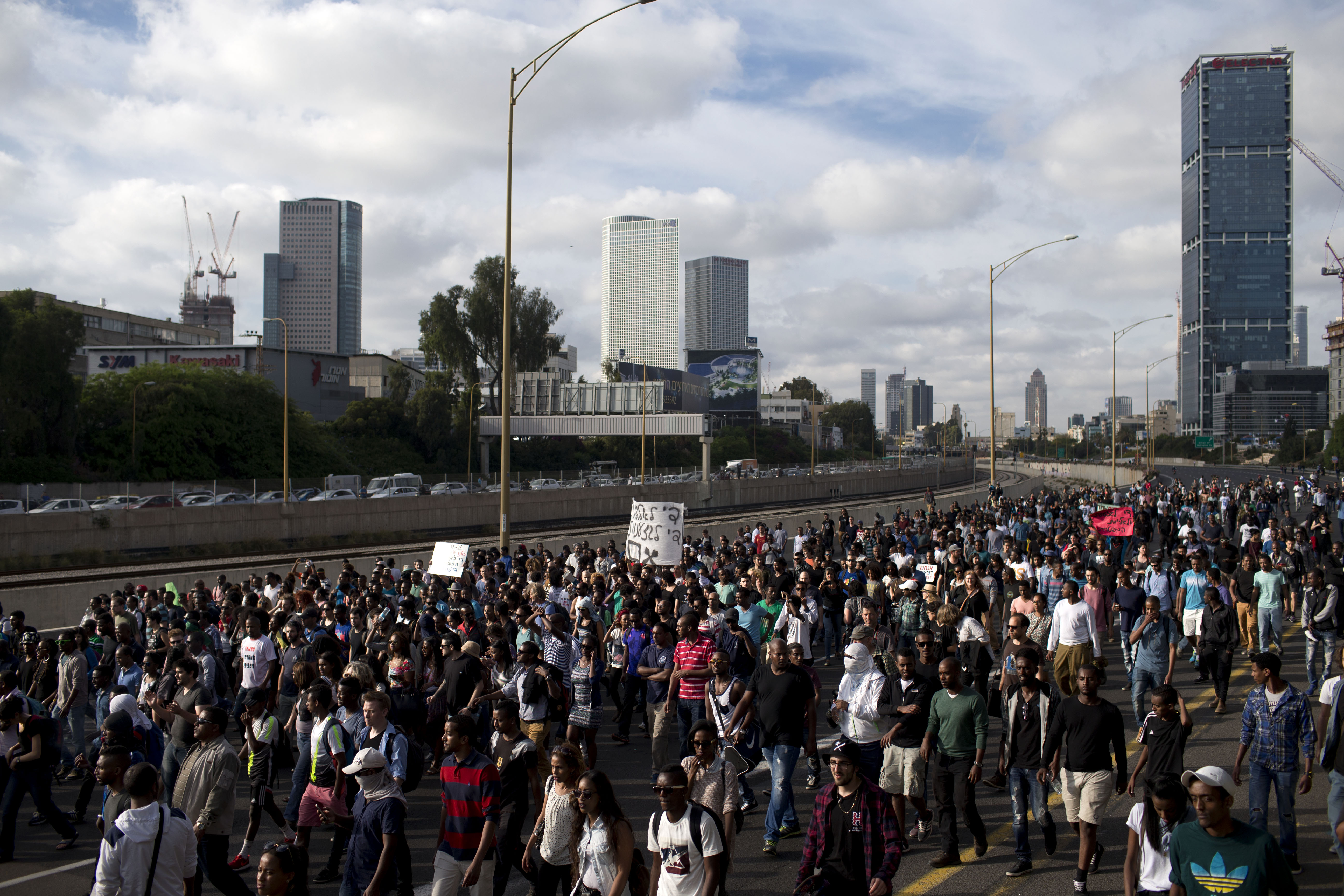Fed up with being treated as second-class citizens for decades, Israel’s Ethiopian Jews are warning they will no longer stand idly by in the face of institutionalized racism.
In the mainly Ethiopian-Jewish area of central town Ramle, there is no sign of the anger that has fueled clashes between protesters and police in nearby Tel Aviv.
An outpouring of racial tension, after incidents of flagrant state brutality against Jews of Ethiopian descent, saw security forces fire stun grenades at stone-throwing demonstrators on Sunday night in the commercial capital.
But despite the calm in Ramle, there is a sense that the Ethiopian community — which makes up some 4,200 of the town’s 76,000 inhabitants — will not accept treatment as second-class citizens for much longer.
Inbal, a young mother walking her son home from school, had attended the Tel Aviv protest.
“We (the community) have been in Israel for 30 years, but there’s still racism in schools and playgrounds,” she said.
“It’s our country too, and we live here. But I don’t think we’ve been allowed to become part of society.”
Local community center director Moshe Hette says Ramle is also home to a large Palestinian-Israeli community, and believes that the seemingly neighborly relationship between Jews and Palestinian in the neighborhood specifically means it should hold the promise of full integration for Ethiopian Jews.
That goal, however, remains distant for now.
“The Jews of Ethiopia suffer from discrimination,” he said.
“Israeli society does not appreciate the value of the Ethiopian community — not the decision-makers, not the ministers, the mayors or the police.
“We still feel a malicious attitude towards us, even after 30 years.”
The mass migration of Ethiopian Jews to Israel began in the 1980s and 1990s, after two secret airlifts by the Jewish state brought thousands who had faced famine and persecution at home.
Ethiopian Jews in Israel now number more than 135,000, but many live in the poorest neighborhoods of major cities.
‘Daily racism’
There are traces of integration and success — MP Abraham Nagosa is a member of Israel’s ruling Likud party, and the Miss Israel 2013 beauty pageant was won by Yityish Aynaw.
But they are rare examples, and more than a third of Ethiopian Israeli families live below the poverty line, and many are confined to menial jobs.
The public community center headed by Hette offers Ethiopians help with schoolwork, driving lessons and pottery classes for women. It also houses an exhibition on Ethiopian customs and traditions to gel the community.
The center is named after Yossi Tabaja, an Israeli army officer of Ethiopian descent who was killed in the West Bank early on in the Second Intifada, in 2000 — an example of integration into Israel’s all-pervasive military.
In stark contrast, the apparent beating by policemen of Damas Pakada, a serving Ethiopian Israeli soldier, in a video that surfaced late April drew the ire of the community in both Jerusalem and Tel Aviv.
Aside from being perceived as an affront to a citizen who like every Israeli Jew was doing his military service, it reminded many from the minority of similar brutal treatment many say they have experienced at the hands of the authorities.
The thousands who demonstrated in Jerusalem and Tel Aviv were mostly young Ethiopians born in Israel, who were demanding to be accepted as part of Israeli society and treated as equals.
Alongside banners denouncing police brutality, many had waved Israeli and Ethiopian flags.
“I am part of society, but I feel racism on a daily basis, especially from police,” said Yoshua, a 20-year-old Ramle resident also undertaking military service.
“In my 20 years here, I’ve always heard talk of racism — nothing’s changed,” he said.
Ethiopian Jews are one of many minority communities facing the daily repercussions of institutionalized racism in Israel.
While state-sanctioned policies aim to maintain a long-term Jewish majority in Israel at the expense of the growth and well-being of Muslim and Christian Palestinian citizens, Jews of Ethiopian, Sephardi, Mizrahi, and other descent have historically faced discrimination and racism by the state.
In 2012, Prime Minister Benjamin Netanyahu, warned that non-registered immigrants from Africa “threaten our existence as a Jewish and democratic state.”
While the President was referring at the time to non-Jewish immigrants only, the racism directed towards immigrants results in direct transfer onto Israel’s Ethiopian Jewish communities.
The state admitted in 2013 to giving widespread contraceptive injections to women of the Ethiopian community without giving full explanation of the effects of the drug.
Israeli leadership has taken steps towards addressing the recent outrage from Ethiopian communities, as Netanyahu called for calm and pledged to take action against those shown beating the Ethiopian soldier in April’s explosive footage.
“I strongly condemn the beating of the Ethiopian IDF soldier and those responsible will be held accountable. However, no one is allowed to take the law into their own hands,” he said in a statement.
Netenyahu personally met with the soldier Monday in attempted reparation, Israeli media reported. MAANNEWS






 WhatsApp us
WhatsApp us 

